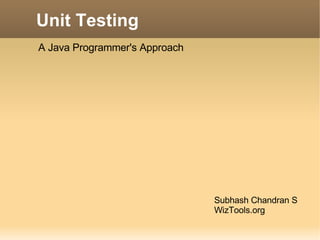Unit Testing
- 1. Unit Testing Subhash Chandran S WizTools.org A Java Programmer's Approach
- 2. Testing What the program is supposed to do == What the program actually does
- 3. Types Unit Integration / Functional System
- 4. Unit Testing, Java Style JUnit TestNG (Will not be discussed in this session)
- 5. JUnit Version 3.x Version 4.x â Java 5 and above features
- 6. What we want to do? Add Remove
- 7. How we did it // ShoppingCart.java public class ShoppingCart{ public void add(Product p, int quantity){ ... } public void remove(Product p, int quantity){ ... } } // Tomato.java public class Tomato implements Product{ ... }
- 8. Add Test in JUnit 3.x import junit.framework.TestCase; public class ShoppingCartTest extends TestCase { private ShoppingCart cart; public void testAdd (){ cart = new ShoppingCart(); Tomato t = new Tomato(); cart.add(t, 10); // Product and quantity assertEquals (cart.count(), 10); } }
- 9. Add Test in JUnit 4.x import org.junit.Test; import static org.junit.Assert.*; public class ShoppingCartTest{ private ShoppingCart cart; @Test public void testAdd() { cart = new ShoppingCart(); Tomato t = new Tomato(); cart.add(t, 10); assertEquals (cart.count(), 10); } }
- 10. Remove Test // Add @Test annotation for JUnit 4.x public void testRemove(){ cart = new ShoppingCart(); Tomato t = new Tomato(); cart.add(t, 10); cart.remove(t, 6); assertEquals(cart.count(), 4); }
- 11. Test Class public class ShoppingCartTest ... { private ShoppingCart cart; public void testAdd(){ cart = new ShoppingCart(); ... } public void testRemove(){ cart = new ShoppingCart(); ... } } Duplication!
- 12. Lifecycle 3.x setUp () testXXX1() tearDown () setUp () testXXX2() tearDown () setUp () testXXX3() tearDown ()
- 13. Lifecycle 4.x @ Before @Test XXX1 @ After @ Before @Test XXX2 @ After @ Before @Test XXX3 @ After
- 14. Final Test Class public class ShoppingCartTest ... { ... // @org.junit.Before to be added for JUnit 4.x protected void setUp (){ cart = new ShoppingCart(); } // @org.junit.After to be added for JUnit 4.x protected void tearDown (){ cart = null; } // test* methods follow }
- 15. Other Assert Methods assertNull(...) assertArrayEquals(..., ...) assertEquals(..., ...) assertSame(..., ...) assertTrue(...) and âNotâ of all the above.
- 16. Our Approach (so far)... We created the domain classes then the test cases to unit test them Another approach...
- 17. Test Driven Development (TDD) First write the test case Then program domain classes to comply to it What the #@&*?
- 18. When programming... Details, details and more implementation details...
- 19. What Tests Do? Tests define the behavior Tests define what you want to achieve Tests define what your program should do
- 20. When All These Are Defined... Your design is beautiful When dealing with implementation details, you will not loose focus You have a execution environment for running your code
- 21. So TDD! And save enough time to enjoy Life!
- 22. What we covered? Meaning and types of testing JUnit 3.x and 4.x TDD
- 23. Action Item Practice TDD :-) Thanks and Bye! Subhash. subwiz (at) gmail.com























